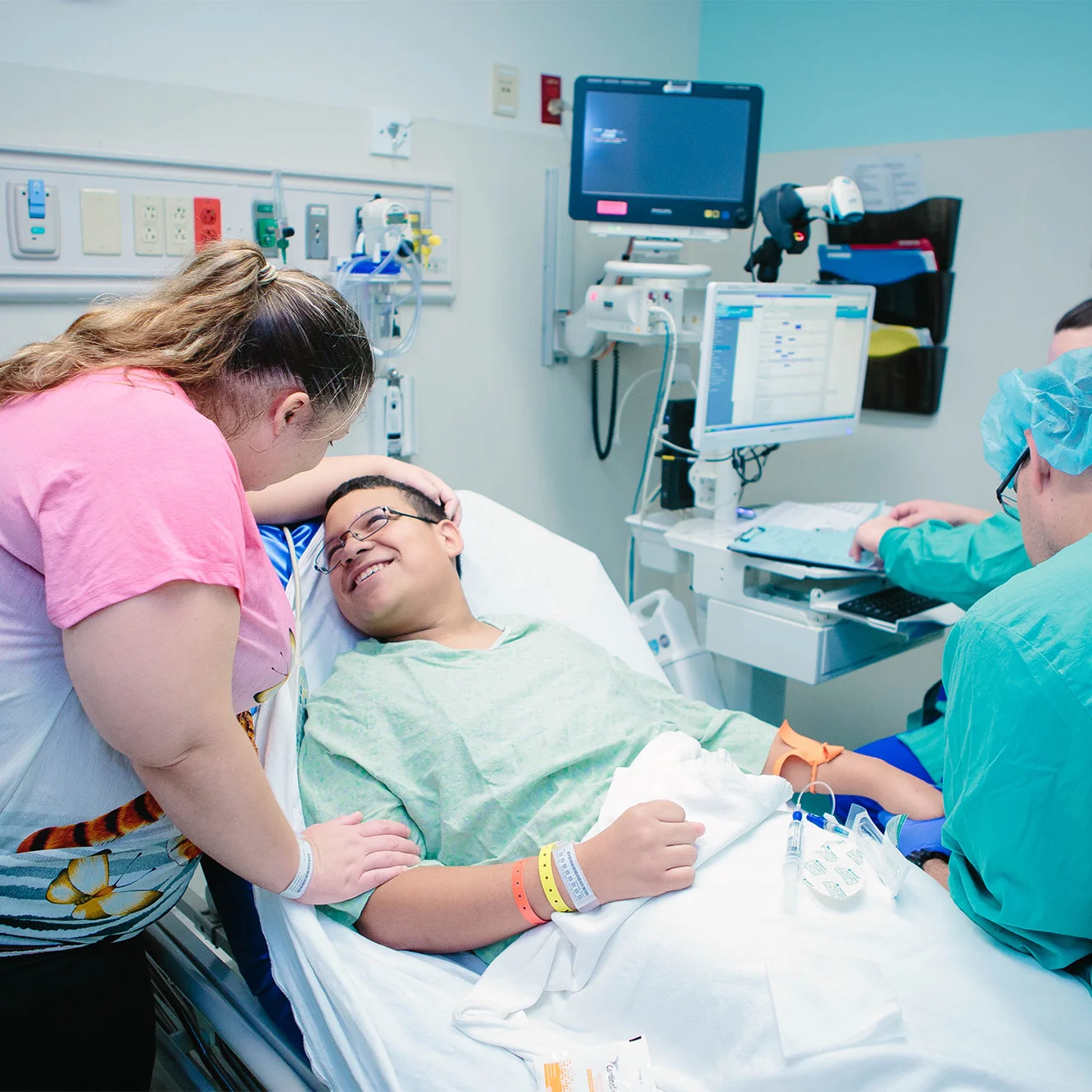Infants (0 to 12 months old)
Infants often respond to the cues of their caregiver. Infants are sensitive to the emotions of those around them. If you are calm and relaxed, your infant is more likely to remain calm in the hospital setting. On the day of surgery, be sure to bring your child’s favorite toy or comfort item to normalize the environment. We recommend that you bring a bottle or cup from home that your child is familiar with to help them with fluid intake following surgery. Keeping your child’s daily routine consistent is also important on the day of surgery.
Toddlers (1 to 3 years old)
Toddlers are best prepared a day before surgery. Remember to use simple words and phrases that they understand and are familiar with. Books are a great resource to help toddlers learn about going to the hospital. To help your child express their feelings, engage them in fantasy play with a toy doctor kit.
Toddlers respond best when given appropriate, realistic choices. For example, “Which toy would you like to take with you today?” or “Which outfit would you like to wear to the hospital?” First, then language can also be beneficial in promoting understanding in toddlers. For example, “FIRST, they will listen to your heart and THEN you can play with toys.”
Toddlers learn through play and watching others. While at the hospital, it is important to explain to your child what a staff member is going to do before they do it. You can do this by practicing on a stuffed animal or allowing the staff member to practice on you first. This helps reduce stress and anxiety and promote learning.
Preschoolers (3 to 5 years old)
It is ideal to prepare your preschooler up to three days before their surgery. Talk to your child about the hospital using simple words and phrases that are familiar to them while describing what they might see, hear and feel during their hospitalization. Explain that the hospital is a safe place where children come so their doctor can help fix their “___.” Honesty is important in maintaining trust with your child. It is helpful to give simple explanations and answers to questions without presenting too many details.
Children of this age can have misconceptions that they have done something wrong or are being punished with surgery. Help your child understand the “why” behind their surgery, procedure, or hospitalization and that they did not do anything wrong to cause this. If your child is showing signs or expressing not being ready to discuss surgery, it is okay to stop the conversation. Forcing the conversation will not be beneficial at this point in their coping process.
Examples:
- Pre-Op room: “Get ready room.”
- Blood pressure cuff: “Give your arm a hug”
- Pulse oximeter: “Light-up Band-Aid”
- Stretcher: “Bed on wheels”
- Recovery room: “Wake up room”
- Operating room: “Sleeping room”
- Anesthesia: “Sleepy medicine” or “sleepy air” It is very important to explain the difference between “sleepy medicine” and sleeping at night. This is a special kind of sleep where they won’t see, hear or feel anything and they will not wake up in the middle. Explain that the doctors will stop giving them “sleepy medicine” when they are done doing their jobs so that they can wake up.
Play is how preschoolers learn and communicate their feelings, so playing “doctor” at home with a toy doctor kit and stuffed animal can promote learning. Examples of what you can practice with your child include: checking temperature and blood pressure, using a stethoscope, taking deep breaths, drinking medication and staying still for height and weight. This will help your child become more familiar with the medical equipment that will be used and the routine prior to their surgery or procedure.
School-Age Children (5 to 12 years old)
It is best to begin preparing your school-aged child about one to two weeks before the surgery. Help explain to your child why they need to have the procedure, surgery or hospitalization so they have a better understanding. Allow your child to ask questions and express any concerns they may have regarding the surgery or the hospital. Provide specific details to your child about what they will hear, see, smell and feel while in the hospital. Honesty is very important. School-age children can have many misconceptions and fears about the hospital. When children receive honest information about what they will experience, they often realize it will be less frightening than what they imagined.
Ask your child open-ended questions, such as, “What questions do you have?” Fear of bodily mutilation is usually common at this age. Preparing your child for seeing stitches, bandages or a cast and discussing how their body part will look different when they come out of surgery is important in reducing stress and anxiety.
Adolescents (12 to 18 years old)
Adolescents are primarily concerned about their body image, loss of control, reliance on their caregivers, opportunities for privacy and maintaining relationships and communication with peers. Discussing in detail what is going to happen before, during and after surgery can help your teenager feel prepared and equipped. Provide as much detail as needed for the specific needs of your child, while remembering to be honest. Encourage adolescents to participate in discussions with their staff members during appointments by empowering your child to create a list of questions and concerns. Respecting and advocating for your adolescent’s need for privacy by allowing them to change clothes in a different room or cover up with a blanket can help them feel a sense of control while hospitalized.
